Unit 2 What time do you go to school语法焦点与同步作文课件(共15张PPT)
文档属性
| 名称 | Unit 2 What time do you go to school语法焦点与同步作文课件(共15张PPT) |  | |
| 格式 | ppt | ||
| 文件大小 | 2.3MB | ||
| 资源类型 | 教案 | ||
| 版本资源 | 人教新目标(Go for it)版 | ||
| 科目 | 英语 | ||
| 更新时间 | 2023-05-15 15:40:32 | ||
图片预览

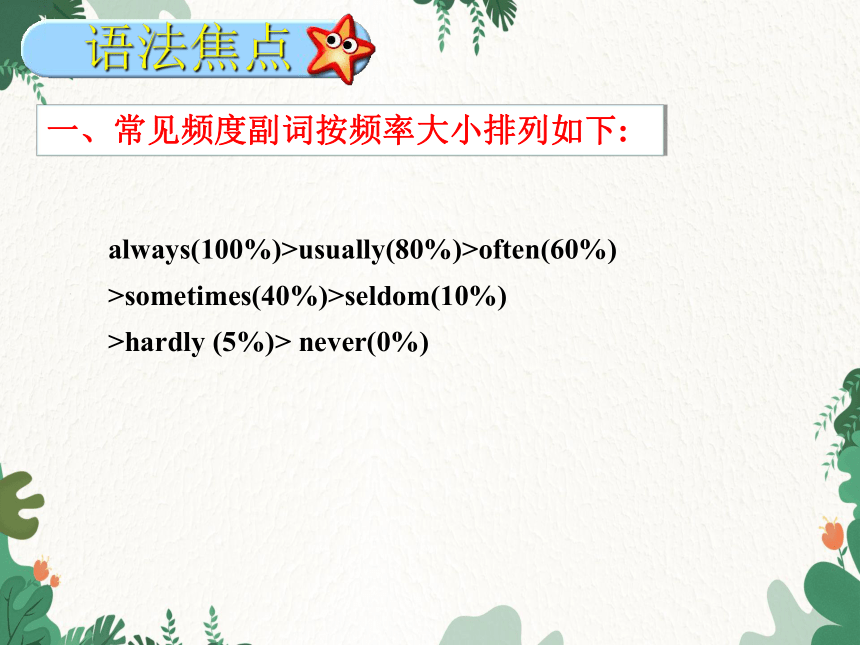
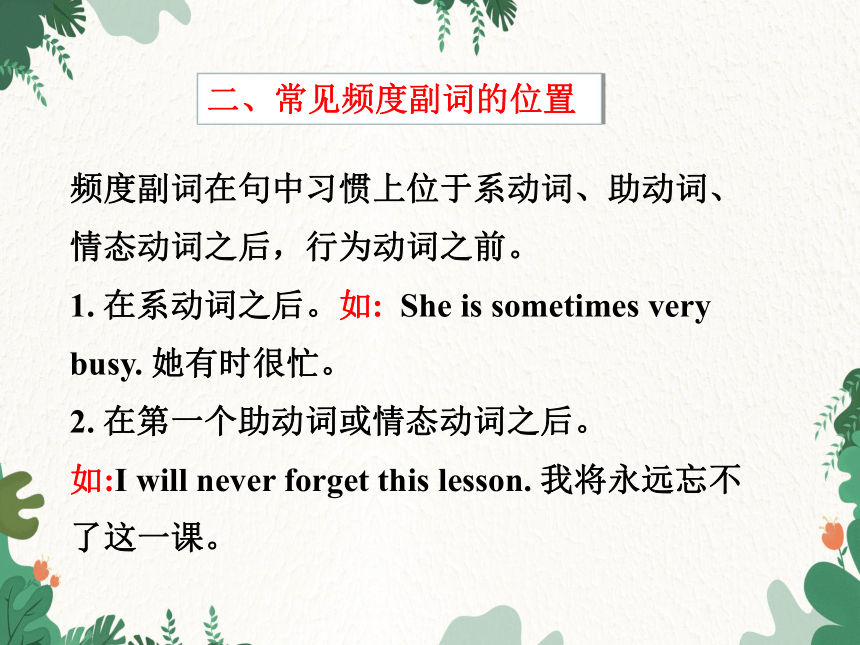
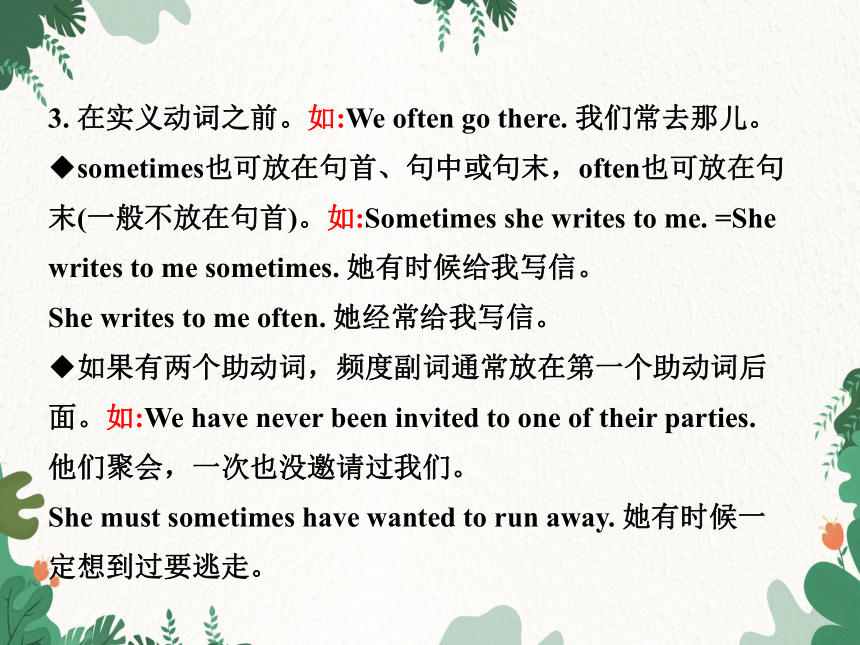
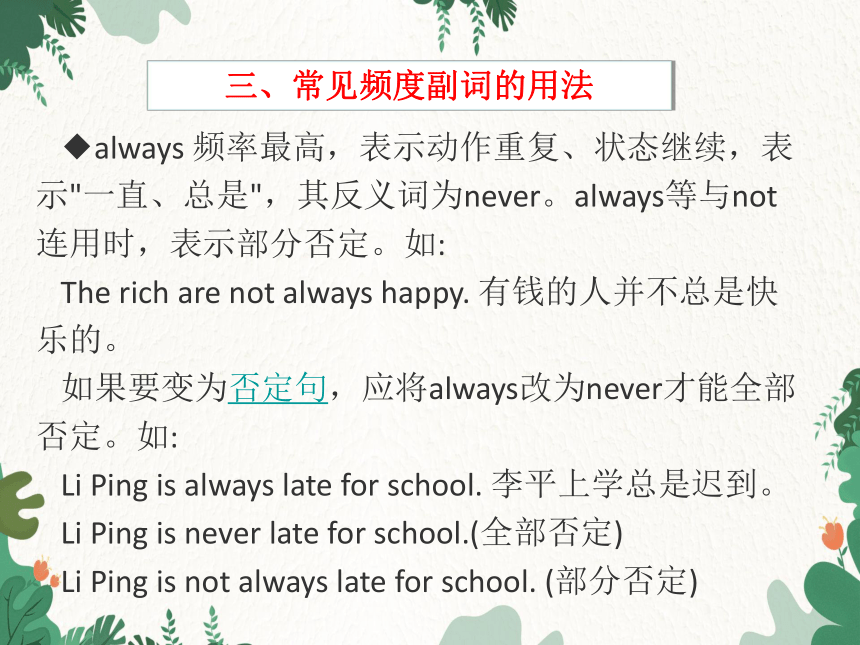
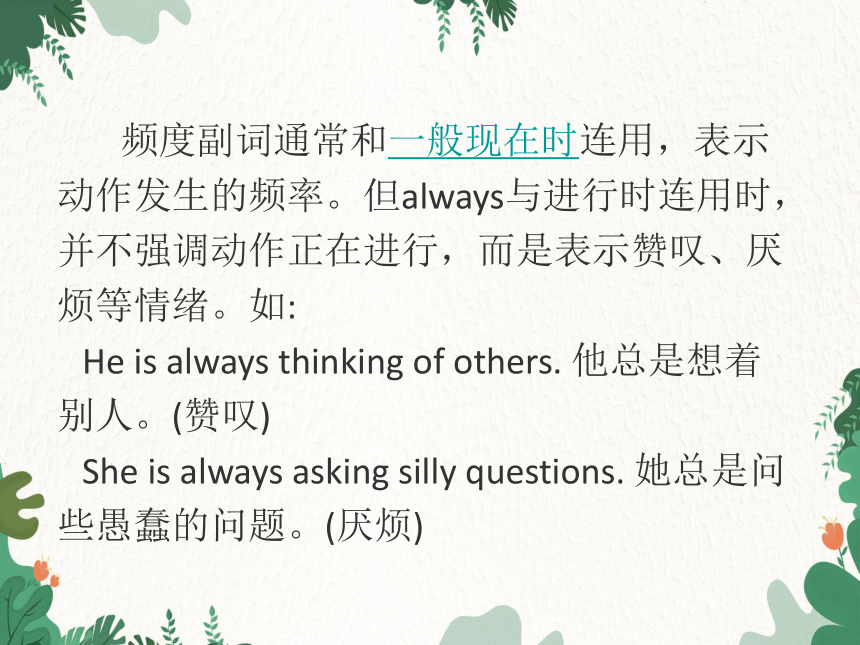
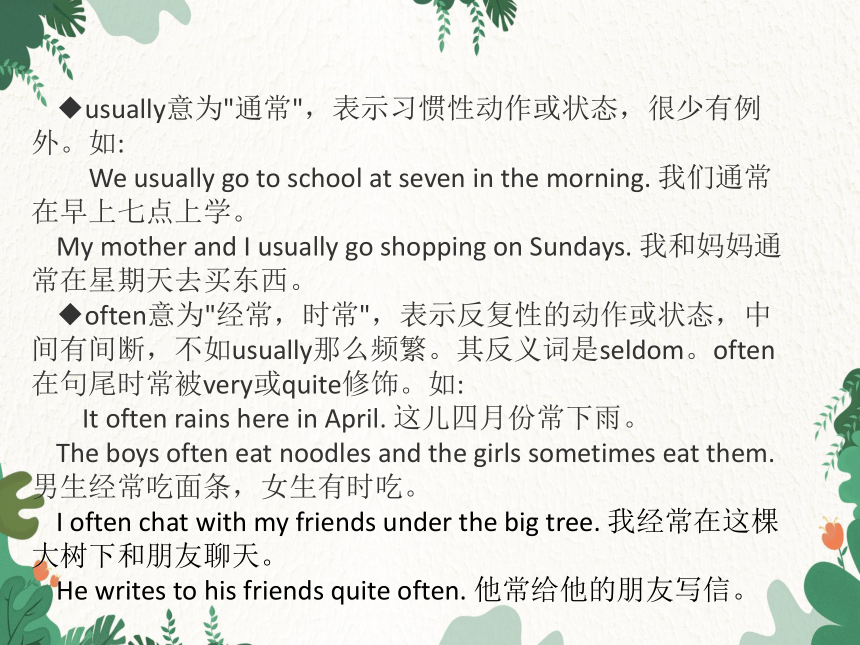
文档简介
(共15张PPT)
语法焦点
与同步作文
七年级英语(下)人教版
语法焦点
一、常见频度副词按频率大小排列如下:
always(100%)>usually(80%)>often(60%)
>sometimes(40%)>seldom(10%)
>hardly (5%)> never(0%)
二、常见频度副词的位置
频度副词在句中习惯上位于系动词、助动词、情态动词之后,行为动词之前。
1. 在系动词之后。如: She is sometimes very busy. 她有时很忙。
2. 在第一个助动词或情态动词之后。
如:I will never forget this lesson. 我将永远忘不了这一课。
3. 在实义动词之前。如:We often go there. 我们常去那儿。
◆sometimes也可放在句首、句中或句末,often也可放在句末(一般不放在句首)。如:Sometimes she writes to me. =She writes to me sometimes. 她有时候给我写信。
She writes to me often. 她经常给我写信。
◆如果有两个助动词,频度副词通常放在第一个助动词后面。如:We have never been invited to one of their parties. 他们聚会,一次也没邀请过我们。
She must sometimes have wanted to run away. 她有时候一定想到过要逃走。
三、常见频度副词的用法
◆always 频率最高,表示动作重复、状态继续,表示"一直、总是",其反义词为never。always等与not连用时,表示部分否定。如:
The rich are not always happy. 有钱的人并不总是快乐的。
如果要变为否定句,应将always改为never才能全部否定。如:
Li Ping is always late for school. 李平上学总是迟到。
Li Ping is never late for school.(全部否定)
Li Ping is not always late for school. (部分否定)
频度副词通常和一般现在时连用,表示动作发生的频率。但always与进行时连用时,并不强调动作正在进行,而是表示赞叹、厌烦等情绪。如:
He is always thinking of others. 他总是想着别人。(赞叹)
She is always asking silly questions. 她总是问些愚蠢的问题。(厌烦)
◆usually意为"通常",表示习惯性动作或状态,很少有例外。如:
We usually go to school at seven in the morning. 我们通常在早上七点上学。
My mother and I usually go shopping on Sundays. 我和妈妈通常在星期天去买东西。
◆often意为"经常,时常",表示反复性的动作或状态,中间有间断,不如usually那么频繁。其反义词是seldom。often在句尾时常被very或quite修饰。如:
It often rains here in April. 这儿四月份常下雨。
The boys often eat noodles and the girls sometimes eat them. 男生经常吃面条,女生有时吃。
I often chat with my friends under the big tree. 我经常在这棵大树下和朋友聊天。
He writes to his friends quite often. 他常给他的朋友写信。
◆sometimes意为"有时",频率不及often,表示动作偶尔发生,间断时间较长。其位置比较灵活,放在句首、句中、句末都可。如:
Sometimes we go to the cinema and at other times we go for a walk.
有时我们去看电影,有时我们去散步。
I sometimes watch TV in the evening. 我有时晚上看电视。
My father has lunch in the factory sometimes. 我父亲有时在工厂吃午饭。
◆hardly具有否定意义,表示"几乎不、简直不",除非特殊情况,否则不会发生。如:
The boy is so young that he could hardly understand it. 这个孩子太小了,不可能懂得这件事。
◆seldom意为"很少";never意为"从不"。这两个副词表示否定意义,动作几乎不会发生。如:
He seldom eats breakfast. 他很少吃早餐。
The little girl seldom goes out. 这个小女孩很少外出。
I will never forget your kindness. 我永远忘不了你的好意。
The boys never eat chocolate and the girls seldom eat it. 男生从不吃巧克力,女生很少吃。
◆对上述频度副词提问时,用how often。如:
I write to my brother sometimes.
→How often do you write to your brother
四、时间表达法
所有的时间都可以用“小时 + 分钟”直接读:
6:10 six ten ;8:30 eight thirty ;2:40 two forty
如果所表述的时间在半小时之内,可以用“分钟 + past + 小时”:
6:10 ten past six ;4:20 twenty past four ;
10:25 twenty-five past ten
如果所表述的时间在半小时之外,可以用“(相差的)分钟 + to + (下一)小时”:
10:35 twenty-five to eleven ; 5:50 ten to six ;
9:49 eleven to ten
如果所表述的时间恰好为半小时,可以用“half + past + 小时”:
11:30 half past eleven ; 2:30 half past two
如果所表述的分钟和15有关,就有三种表达法:
(15分钟又叫一刻钟:a quarter)
9:15 - nine fifteen ; fifteen past nine ; a quarter past nine
3:45 - three forty-five ; fifteen to four ; a quarter to four
整点:
现在是两点整。
It's two.
It's two o'clock.
另外英语中的 noon 和 midnight
可分别直接表示白天和夜晚的12点:
It's (twelve) noon. 现在是中午十二点。
It's (twelve) midnight. 现在是半夜零点。
大约时间:
It's almost two. 马上到两点了。
It's not quite two. 还不到两点。
It's just after two. 刚过两点。
*若想表明是上午,可在时间后加上a.m.,如:
thirteen past six a.m.(上午六点十三分)。
若想表明是下午,可在时间后加上p.m.,如:
four o'clock p.m.(下午四点)。
写作示例
根据下面的表格提示,以“My Saturday” 为题写一篇短文,词数60左右。
时间 活动内容 时间 活动内容
7:00 起床 14:00—17:00 与朋友一起踢足球
7:30 吃早饭 18:00 吃晚饭
8:00—11:00 做家庭作业 19:00—21:00 在家看电视
12:00 吃午饭 21:30 去睡觉
Thank you!
语法焦点
与同步作文
七年级英语(下)人教版
语法焦点
一、常见频度副词按频率大小排列如下:
always(100%)>usually(80%)>often(60%)
>sometimes(40%)>seldom(10%)
>hardly (5%)> never(0%)
二、常见频度副词的位置
频度副词在句中习惯上位于系动词、助动词、情态动词之后,行为动词之前。
1. 在系动词之后。如: She is sometimes very busy. 她有时很忙。
2. 在第一个助动词或情态动词之后。
如:I will never forget this lesson. 我将永远忘不了这一课。
3. 在实义动词之前。如:We often go there. 我们常去那儿。
◆sometimes也可放在句首、句中或句末,often也可放在句末(一般不放在句首)。如:Sometimes she writes to me. =She writes to me sometimes. 她有时候给我写信。
She writes to me often. 她经常给我写信。
◆如果有两个助动词,频度副词通常放在第一个助动词后面。如:We have never been invited to one of their parties. 他们聚会,一次也没邀请过我们。
She must sometimes have wanted to run away. 她有时候一定想到过要逃走。
三、常见频度副词的用法
◆always 频率最高,表示动作重复、状态继续,表示"一直、总是",其反义词为never。always等与not连用时,表示部分否定。如:
The rich are not always happy. 有钱的人并不总是快乐的。
如果要变为否定句,应将always改为never才能全部否定。如:
Li Ping is always late for school. 李平上学总是迟到。
Li Ping is never late for school.(全部否定)
Li Ping is not always late for school. (部分否定)
频度副词通常和一般现在时连用,表示动作发生的频率。但always与进行时连用时,并不强调动作正在进行,而是表示赞叹、厌烦等情绪。如:
He is always thinking of others. 他总是想着别人。(赞叹)
She is always asking silly questions. 她总是问些愚蠢的问题。(厌烦)
◆usually意为"通常",表示习惯性动作或状态,很少有例外。如:
We usually go to school at seven in the morning. 我们通常在早上七点上学。
My mother and I usually go shopping on Sundays. 我和妈妈通常在星期天去买东西。
◆often意为"经常,时常",表示反复性的动作或状态,中间有间断,不如usually那么频繁。其反义词是seldom。often在句尾时常被very或quite修饰。如:
It often rains here in April. 这儿四月份常下雨。
The boys often eat noodles and the girls sometimes eat them. 男生经常吃面条,女生有时吃。
I often chat with my friends under the big tree. 我经常在这棵大树下和朋友聊天。
He writes to his friends quite often. 他常给他的朋友写信。
◆sometimes意为"有时",频率不及often,表示动作偶尔发生,间断时间较长。其位置比较灵活,放在句首、句中、句末都可。如:
Sometimes we go to the cinema and at other times we go for a walk.
有时我们去看电影,有时我们去散步。
I sometimes watch TV in the evening. 我有时晚上看电视。
My father has lunch in the factory sometimes. 我父亲有时在工厂吃午饭。
◆hardly具有否定意义,表示"几乎不、简直不",除非特殊情况,否则不会发生。如:
The boy is so young that he could hardly understand it. 这个孩子太小了,不可能懂得这件事。
◆seldom意为"很少";never意为"从不"。这两个副词表示否定意义,动作几乎不会发生。如:
He seldom eats breakfast. 他很少吃早餐。
The little girl seldom goes out. 这个小女孩很少外出。
I will never forget your kindness. 我永远忘不了你的好意。
The boys never eat chocolate and the girls seldom eat it. 男生从不吃巧克力,女生很少吃。
◆对上述频度副词提问时,用how often。如:
I write to my brother sometimes.
→How often do you write to your brother
四、时间表达法
所有的时间都可以用“小时 + 分钟”直接读:
6:10 six ten ;8:30 eight thirty ;2:40 two forty
如果所表述的时间在半小时之内,可以用“分钟 + past + 小时”:
6:10 ten past six ;4:20 twenty past four ;
10:25 twenty-five past ten
如果所表述的时间在半小时之外,可以用“(相差的)分钟 + to + (下一)小时”:
10:35 twenty-five to eleven ; 5:50 ten to six ;
9:49 eleven to ten
如果所表述的时间恰好为半小时,可以用“half + past + 小时”:
11:30 half past eleven ; 2:30 half past two
如果所表述的分钟和15有关,就有三种表达法:
(15分钟又叫一刻钟:a quarter)
9:15 - nine fifteen ; fifteen past nine ; a quarter past nine
3:45 - three forty-five ; fifteen to four ; a quarter to four
整点:
现在是两点整。
It's two.
It's two o'clock.
另外英语中的 noon 和 midnight
可分别直接表示白天和夜晚的12点:
It's (twelve) noon. 现在是中午十二点。
It's (twelve) midnight. 现在是半夜零点。
大约时间:
It's almost two. 马上到两点了。
It's not quite two. 还不到两点。
It's just after two. 刚过两点。
*若想表明是上午,可在时间后加上a.m.,如:
thirteen past six a.m.(上午六点十三分)。
若想表明是下午,可在时间后加上p.m.,如:
four o'clock p.m.(下午四点)。
写作示例
根据下面的表格提示,以“My Saturday” 为题写一篇短文,词数60左右。
时间 活动内容 时间 活动内容
7:00 起床 14:00—17:00 与朋友一起踢足球
7:30 吃早饭 18:00 吃晚饭
8:00—11:00 做家庭作业 19:00—21:00 在家看电视
12:00 吃午饭 21:30 去睡觉
Thank you!
同课章节目录
- Unit 1 Can you play the guitar?
- Section A
- Section B
- Unit 2 What time do you go to school?
- Section A
- Section B
- Unit 3 How do you get to school?
- Section A
- Section B
- Unit 4 Don't eat in class.
- Section A
- Section B
- Unit 5 Why do you like pandas?
- Section A
- Section B
- Unit 6 I'm watching TV.
- Section A
- Section B
- Review of Units 1-6
- Unit 7 It's raining!
- Section A
- Section B
- Unit 8 Is there a post office near here?
- Section A
- Section B
- Unit 9 What does he look like?
- Section A
- Section B
- Unit 10 I'd like some noodles.
- Section A
- Section B
- Unit 11 How was your school trip?
- Section A
- Section B
- Unit 12 What did you do last weekend?
- Section A
- Section B
